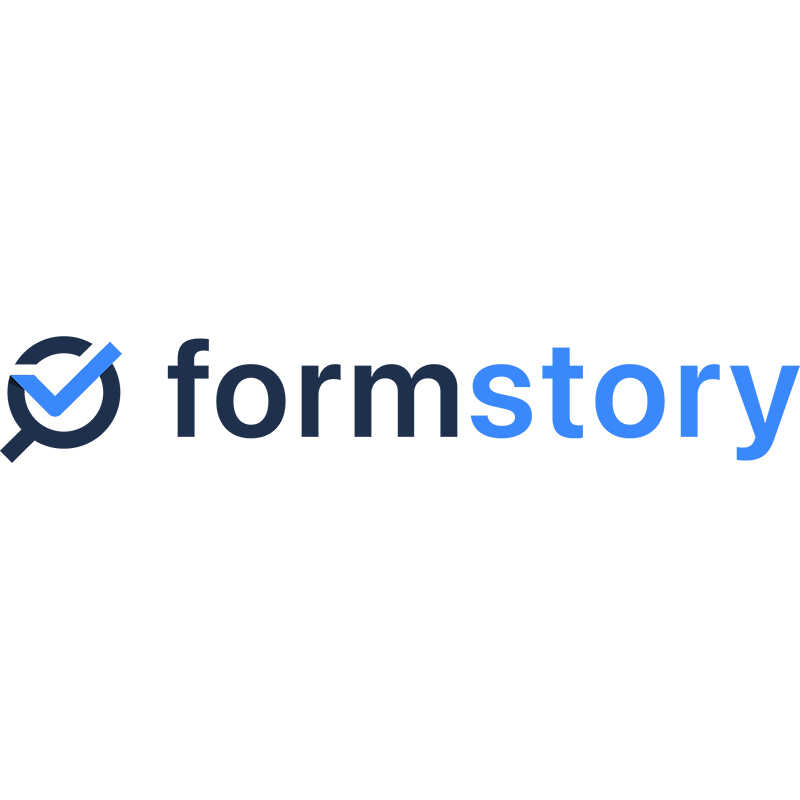Yes, most market intelligence software nowadays is built to work across numerous devices and platforms. This means you may use the software on a desktop computer, laptop, tablet, or mobile phone, as well as on a variety of operating systems including Windows, MacOS, iOS, and Android. This provides flexibility and convenience by allowing users to readily access the software regardless of where they are or what device they are using.
List of 20 Best Market Intelligence Software
the Marcom Robot Data Enrichment Engine solution for improving the accuracy and effectiveness of your CRM data. Our powerful tool provides real-time validation, enrichment, and scoring, ensuring that you have trustworthy, current information to drive...Read More Marcom Robot Data Enrichment Engine
FormStory is a form tracking software to improve your submission rates and eliminate errors. By utilizing advanced technology, it monitors all form activity and captures partial entries for further analysis. With FormStory, rest assured that youll ne...Read More FormStory
Orbis is a data platform that provides detailed information on over 525 million businesses worldwide. It includes advanced tools for financial evaluation, compliance, and risk management, enabling companies to make informed decisions and improve thei...Read More Orbis
RealityMine is an advanced software that provides powerful insights into the authentic digital behaviors of consumers on multiple devices. With its cutting-edge technology, brands can gain a deep understanding of their audience and create stronger co...Read More RealityMine
Mining Intelligence is a platform that offers easy access to mining data and analysis tools. Its user-friendly design and intuitive navigation make it suitable for all levels of technical proficiency. By translating complex insights into actionable i...Read More Mining Intelligence
Kantar Marketplace, an advanced platform crafted to drive brand growth by providing cutting-edge analytics and insights. With a global reach of 90 markets, businesses can access real-time data, expert perspectives, and practical strategies to gain a...Read More Kantar Marketplace
Amaiz is a digital banking solution for your business needs. With seamless international transactions, personalized accounts, and top-notch security measures, Amaiz streamlines your financial management. Easy set-up process online and a variety of fl...Read More Amaiz
ReportLinker - platform that gathers and evaluates market research data, providing comprehensive market intelligence for businesses. Its intuitive interface, customized reports, and real-time updates enable businesses to stay ahead of industry trends...Read More ReportLinker
CB Insights is a software designed for VC firms, offering instant, AI-driven insights and comprehensive market analysis. It streamlines strategic planning, accurately predicts company success, and provides unparalleled data to keep you ahead in a dyn...Read More CB Insights
TRAK is a marketing solution that prioritizes simplicity and effectiveness. Gain immediate access to valuable data, leverage cutting-edge AI modeling, and seamlessly engage your desired audience. Streamline your marketing tactics and accurately targe...Read More TRAK
Exact Buyer is a AI-powered software that transforms B2B prospecting. With its speedy identification of optimal prospects, targeted and data-based campaigns, effortless CRM integration, and valuable insights, it simplifies your outreach and elevates...Read More Exact Buyer
Sprinklr is a Social Media Management software, specially designed for large-scale enterprises. It presents a comprehensive solution for global marketing automation, social CRM, Twitter analytics, and digital asset management. With Sprinklr, business...Read More Sprinklr
CHD Expert is marketing solution designed to help businesses boost their market share and improve conversion rates. With a comprehensive database of over 9 million foodservice establishments around the globe, it offers valuable insights to identify a...Read More CHD Expert
Arbit - an innovative software solution designed to enhance decision-making within teams. By utilizing collaborative voting and dynamic analytics, it facilitates a democratic approach to organizational processes, leading to increased team efficiency...Read More Arbit
PitchBook is a Sales Intelligence software designed for the unique requirements of venture capital and private equity sectors. It provides top-notch information, news, and insights, making it an essential tool for experts in these industries. Through...Read More PitchBook
Crunchbase, Sales Intelligence platform catering to professionals in various roles such as sales, marketing, finance, recruitment, and leadership. Through personalized features like account suggestions, lists, and territory settings, Crunchbase strea...Read More Crunchbase
Cronycle is a dynamic content curation platform that caters to the needs of professionals by helping them efficiently discover, organize, and share relevant information. With its intuitive workflow, Cronycle ensures that users are always up-to-date w...Read More Cronycle
Demandbase is a ABM solution for tracking and measuring the success of your marketing strategies. With its all-in-one platform, youll gain valuable insights on your target audience and confidently drive successful outcomes throughout the marketing fu...Read More Demandbase
DiscoverOrg is a leading Sales Intelligence platform designed to assist B2B Sales and Marketing teams. It simplifies lead generation, maintains a precise database, and delivers personalized messages at strategic times to increase revenue. Our softwar...Read More DiscoverOrg
SiteMinder is a hotel management software crafted by professionals in the industry. It enhances your hotels online presence and drives more website traffic and bookings. Through seamless integration with multiple third-party applications, it simplifi...Read More SiteMinder
Learn More About Market Intelligence Software
- What Is Market Intelligence Software?
- What Are The Recent Trends In Market Intelligence Software?
- Benefits Of Using Market Intelligence Software
- Important Factors To Consider While Purchasing Market Intelligence Software?
- What Are The Key Features To Look For In Market Intelligence Software?
- Why Do Businesses Need Market Intelligence Software?
- How Much Time Is Required To Implement Market Intelligence Software?
- What Is The Level Of Customization Available In Market Intelligence Software?
- Which Industries Can Benefit The Most From Market Intelligence Software?
- Conclusion
What Is Market Intelligence Software?
Market Intelligence Software is a strong tool that assists businesses in gathering and analyzing market data so that they may make informed decisions. It provides business leaders with vital information on the competitive landscape, consumer behavior, and market trends. Businesses who use this software can get a competitive advantage by staying ahead of the curve and making strategic decisions based on real-time data.
One of the most important advantages of Market Intelligence Software is its capacity to collect data from a variety of sources, including social media, news articles, financial reports, and more. This data is then organized and evaluated, providing organizations with a complete picture of their target market and competition. Another benefit of employing Market Intelligence Software is its capacity to deliver real-time information on market trends.
This enables organizations to quickly adapt their plans to remain relevant and competitive in their sector. One of the most notable advantages of this program is its predictive analytics capabilities, which analyze past data to estimate future market patterns. This enables firms to anticipate client wants and make proactive actions that promote growth and success. Overall, Market Intelligence Software is an excellent resource for firms seeking to obtain a better grasp of their sector and make more educated decisions. It streamlines the data collection and analysis process, saving time and resources while delivering useful insights for strategic planning.
What Are The Recent Trends In Market Intelligence Software?
Market intelligence software is a strong tool that helps firms understand market trends, customer behavior, and rival strategy. As technology advances, new trends emerge in the market intelligence software field, making it critical for purchasers to remain current and educated.
In this buyer's guide, we'll go over the latest trends in market intelligence software that purchasers should be aware of before making a purchase.
1. AI Integration: AI is transforming the market intelligence arena by allowing software to gather, analyze, and interpret data quickly and accurately. With more data available, AI-powered market intelligence software may deliver more in-depth insights and predictive analytics, allowing organizations to make better decisions.
2. Real-Time Data Analysis: The demand for real-time insights is fast growing, and market intelligence software is keeping up. Recent trends indicate a shift toward real-time data collection and analysis technologies, which provides firms with quick and actionable insights.
3. Integration With Other Systems: To improve the flexibility and efficacy of market intelligence software, integration with other corporate systems, such as CRM and marketing automation platforms, is becoming increasingly popular. This enables organizations to have a complete perspective of their customer data and combine it with market intelligence data to gain a better understanding of their target market.
4. Mobile Accessibility: As remote work and the mobile workforce become more prevalent, market intelligence software that is mobile accessible is in great demand. This trend allows firms to access and evaluate data on the go, making it easier to stay informed and make quick decisions.
5. Data Visualization: As the volume of data grows, businesses seek ways to make it more accessible and visually appealing. Data visualization tools are now being integrated into market intelligence software to help firms better grasp complex data sets.
6. Emphasis On Consumer Experience: Market intelligence software is becoming more focused on understanding the consumer experience and journey. This trend enables firms to collect data on consumer behavior and preferences, allowing them to develop more personalized and targeted marketing campaigns.
7. Data Security: In today's digital world, data security is critical for enterprises. Recent trends indicate that market intelligence software now includes advanced security capabilities to secure sensitive data from unauthorized access.
Benefits Of Using Market Intelligence Software
Market Intelligence Software (MIS) is a strong tool that helps firms gain useful insights and develop data-driven strategies to stay ahead of the competition. With the ever-changing business landscape, firms need access to real-time data and analytics. MIS delivers a comprehensive solution that enables businesses to make educated decisions and drive growth.
The following are the key advantages of employing Market Intelligence Software for your business:
1. In-Depth Market Study: MIS collects and analyzes data from many sources to provide an in-depth market study. This covers rival activity, consumer behavior, industry trends, and much more. It enables firms to better understand their target market, uncover new opportunities, and make informed decisions in order to remain competitive.
2. Real-Time And Correct Data: The true value of MIS is its ability to produce timely and correct data. MIS provides organizations with relevant and exact information by utilizing advanced data mining and analytics tools. This allows them to have a better grasp of market dynamics and react rapidly to changes, giving them a competitive advantage.
3. Identify Emerging Trends And Opportunities: MIS utilizes AI and machine learning algorithms to identify emerging trends and patterns in the market. This allows firms to stay ahead of the competition by forecasting the latest market trends and consumer preferences. It also assists firms in identifying untapped opportunities and developing successful strategies to capitalize on them.
4. Competitive Intelligence: MIS gives firms a complete picture of their competitors' strategy, strengths, and vulnerabilities. This helps organizations to evaluate themselves against their competitors and find methods to enhance their products, services, and marketing activities. It also helps to identify future market threats and problems.
5. Configurable Dashboards And Reports: MIS provides configurable dashboards and reports that show data in a visual format, making it easier to grasp and interpret. Businesses can tailor these reports to their specific requirements, making it easier to track and evaluate critical indicators and KPIs.
6. Cost And Time Savings: By automating and streamlining data gathering and processing, MIS saves firms time and money. It eliminates the need for human data gathering and processing, lowering the risk of errors and inconsistencies. This also saves money because businesses no longer need to hire a specialist market research staff.
Important Factors To Consider While Purchasing Market Intelligence Software?
In today's fast-paced business environment, maintaining one step ahead of the competition is critical. Here is when market intelligence software comes in handy. It gives businesses with useful insights and data to help them make better decisions and acquire a competitive advantage. However, with so many options available in the market, selecting the correct market intelligence software can be difficult.
To help you make an informed decision, below are the crucial aspects to consider when selecting market intelligence software.
1. Determine Your Specific Demands: Before you begin examining various possibilities, you must first establish your company's specific objectives and goals. This can help you limit down the list of software options that meet your needs and budget.
2. Data Sources And Collection Methods: The sources of data, as well as how the information is collected and delivered, are critical considerations when selecting market intelligence software. Some software is based on primary research, but others collect data from secondary sources like social media. Check that the program has access to a wide range of data sources that are important to your organization.
3. Customization And Flexibility: Each business has unique requirements and operations. As a result, it is critical to select software that can be tweaked and tailored to meet your specific business needs. It should also be adaptable enough to meet your changing needs.
4. User Interface And Ease Of Use: The software's interface should be intuitive and easy to use. The primary goal of market intelligence software is to facilitate data analysis and decision-making, so choose software that your team can use and comprehend.
5. Accuracy And Reliability: Making good business decisions requires the software's data to be accurate. Look for software with a track record of producing accurate and reliable data.
6. Integration Capabilities: Choose market intelligence software that works easily with your existing systems and solutions. This will save you time and effort in manually transferring data between systems.
7. Data Visualization And Reporting: The program should have strong data visualization and reporting capabilities. It should be able to display complex data visually, making it easier to grasp and analyze trends and patterns.
8. Scalability And Future Needs: As your firm expands, so will your data requirements. Choose scalable software that can meet your future needs.
9. Customer Support: It is critical to have dependable customer service to assist you in the event of any technical issues or questions.
10. Budget: Finally, examine your budget and the expected return on investment from the program. Select software that provides good value for money and suits your budget.
What Are The Key Features To Look For In Market Intelligence Software?
Choosing the correct market intelligence software can significantly effect a company's success. With so many options on the market, it can be difficult to evaluate which software is the best fit for your firm.
To make an informed decision, below are the essential elements to look for in market intelligence software:
1. Data Collection And Organization: The fundamental job of market intelligence software is to collect and arrange data from a variety of sources. It should be able to collect both internal and external market data, such as competition information, market trends, and customer feedback. The program should also efficiently organize data into useful insights for decision-making.
2. Real-Time Monitoring: Staying up to date on current market trends and changes is an important feature of marketing intelligence. The program should give real-time monitoring and alerts to keep you up to date on any changes in your industry. This feature enables organizations to make quick and informed decisions, giving them a competitive advantage over their competitors.
3. Customizable Analytics: Each organization has unique data requirements, and the software should be able to provide customized analytics to meet those needs. Drill-down analysis, data visualization, and configurable dashboards are all useful capabilities for gaining in-depth insights into your market data.
4. Competitor Analysis: The program should include features for conducting detailed competitor analysis. This includes keeping track of competitors' actions, pricing strategies, product offerings, and market share. With this information, organizations may recognize opportunities and make informed decisions to stay ahead of the competition.
5. Integration And Compatibility: For the best results, your market intelligence software should interface effortlessly with your existing systems. This covers CRM, ERP, and other data sources to create a comprehensive picture of your company. To avoid technical issues, ensure that the program is compatible with your existing systems.
6. User-Friendly Interface: For market intelligence software to be used effectively, it must have an intuitive and simple interface. Look for software with an easy-to-use interface that doesn't require substantial training. This will save time and money while also ensuring the software's smooth adoption.
Why Do Businesses Need Market Intelligence Software?
Market intelligence software is an effective tool for firms to get important insights and make educated decisions by studying market data. In today's fast-paced and ever-changing business environment, access to real-time and reliable market data is critical to success.
Here are the primary reasons why organizations want market intelligence software:
1. Stay Ahead Of The Competition: With increased competition in all industries, firms must constantly examine their competitors' strategy, products, and market trends. Market intelligence software delivers vital information on your competitors, giving you a competitive advantage and allowing you to stay ahead of the game.
2. Find Opportunities And Risks: By studying market data, firms can find possible areas for growth and expansion. On the other side, market intelligence tools can assist firms identify possible dangers and threats, allowing them to take proactive steps to manage them.
3. Make Data-Driven Decisions: Market intelligence software provides firms with dependable and accurate data, removing the guesswork and allowing them to make data-driven decisions. This can lead to enhanced operational efficiency, cost savings, and increased profitability.
4. Target The Right Audience: With a greater understanding of the market and consumer behavior, organizations can better target their marketing campaigns. Market intelligence software assists organizations in identifying their target market, needs, and preferences, allowing them to adjust their messaging and enhance conversions.
5. Monitor Industry Trends: By regularly monitoring market trends, organizations may respond to changes in customer demand and industry dynamics. This can help them remain relevant and competitive in the marketplace.
6. Improve Product Development: Market intelligence software helps organizations understand consumer demands, preferences, and feedback. This can help businesses develop and improve products that meet market demand, resulting in increased consumer happiness and loyalty.
Overall, market intelligence software is an essential tool for firms seeking to acquire a competitive advantage, make data-driven decisions, and remain relevant in a constantly changing market. With its capacity to supply real-time and accurate market data, organizations may make strategic and informed decisions that have a significant impact on their success and growth. Investing in market intelligence software is a good move for any firm that wants to stay ahead of the competition and achieve long-term success.
How Much Time Is Required To Implement Market Intelligence Software?
The deployment time for market intelligence software varies according to the solution and the complexity of your organization's data and operations. On average, it can take between a few weeks and several months to fully integrate and install a market intelligence software solution. The initial setup and data migration process can take some time because the software needs to be configured and adjusted to meet your individual business requirements.
This may entail integrating with existing systems and databases, creating user accounts and permissions, and importing historical data. Once the initial setup is complete, employee training and onboarding can take some time, since the software may contain new features and functionalities that must be mastered and integrated into daily work. Furthermore, the time necessary for implementation can vary depending on the size and complexity of your firm.
Smaller firms with simpler data structures may be able to use the software sooner, whereas larger enterprises with several departments and data sources may require more time to achieve seamless integration. However, keep in mind that the implementation phase is important to the software's success. Taking the time to properly configure and train employees ensures that the software is used efficiently and produces accurate and useful data for business decisions. Overall, while early market intelligence software acceptance may be slow, the long-term benefits, such as increased productivity and decision-making accuracy, make the investment worthwhile.
What Is The Level Of Customization Available In Market Intelligence Software?
Market intelligence software provides varied levels of customisation, allowing organizations to adjust the product to their individual requirements and industry. Customization options enable more personalized and efficient use of the software, leading to better decision-making and overall performance. On a fundamental level, most market intelligence software allows customers to specify the sorts of data they want to collect and analyze.
This could include specific sectors, markets, rivals, or other pertinent factors. Users can also configure alerts and notifications for certain events or changes to ensure they are up to date on the most important information. Some market intelligence software goes a step further, allowing customers to customize their visuals and dashboards. This enables firms to display data in the most helpful format for them, whether through charts, graphs, maps, or other visual aids.
Furthermore, several market intelligence software packages provide advanced customization options via integrations and APIs. This enables firms to integrate the software with other tools and systems, such as CRM or marketing automation platforms, increasing the level of customization and streamlining procedures. Creating bespoke reports and analysis is an important customization capability of market intelligence software.
This enables firms to delve deeper into specific areas of interest, gaining unique insights that can inform strategic decisions. Before investing in market intelligence software, organizations must examine their customisation requirements and compare them to the solutions available. While some tools provide for more customisation, they may be more expensive. It is critical to strike a balance between customisation and budget to guarantee that the software matches the specific needs of the organization.
Which Industries Can Benefit The Most From Market Intelligence Software?
industry Intelligence Software is a strong tool that may help organizations make educated decisions in today's highly competitive industry. While it can benefit firms in a variety of industries, certain industries will profit the most from this software.
We'll look at the top industries that can profit the most from Market Intelligence Software.
1. Retail Industry: The retail business is heavily reliant on consumer behavior and market developments. Retailers can use Market Intelligence Software to acquire useful insights into consumer preferences, purchase habits, and rival strategy. This information can assist them improve their product offers, pricing, and overall business strategy.
2. Healthcare Industry: The healthcare business relies heavily on fast and accurate information to make key choices. Market Intelligence Software can give healthcare firms with real-time information about patient demographics, market trends, and competitor analysis. This allows them to make data-driven decisions, which improves patient care.
3. Technology Industry: The quick pace of technical breakthroughs has made it difficult for organizations in the technology industry to stay current with the latest trends and innovations. Market Intelligence Software can help organizations in this industry gain significant insights about developing technology, competition strategies, and market trends. This allows them to make more informed judgments and stay ahead of the competition.
4. Financial Services Industry: In the highly regulated and dynamic financial services industry, companies must make strategic decisions fast. Financial institutions can use Market Intelligence Software to study market trends, monitor competitors, and uncover new business prospects. This helps them to make data-driven decisions while remaining compliant with rules.
5. Consumer Goods Industry: The consumer goods business is extremely competitive, with ever-changing consumer preferences and market trends. Market Intelligence Software can supply organizations in this industry with real-time information on consumer behavior, rival strategy, and market trends. This allows companies to adjust their product offerings, pricing, and marketing methods to match the ever-changing wants of their customers.
Conclusion
Finally, selecting the appropriate market intelligence software for your firm might be a critical decision. Making the perfect decision might be difficult when there are so many options on the market. However, by taking into account essential aspects such as your specific business requirements, budget, and desired features, you can narrow down your selections and choose the finest software for your corporation.
Before making a final decision, conduct extensive research and comparisons of other software suppliers, their reputations, and customer evaluations. This will ensure that you invest in a dependable and effective solution that supports your business objectives and allows you to make educated decisions. Remember that market intelligence tools can provide vital insights and help you get a competitive advantage in the industry.
So, it is critical to select a solution that not only fits your current requirements but also has the capacity to scale and grow with your company in the future. We hope that the information and recommendations provided in this buyer's guide will help you confidently traverse the market intelligence software landscape and choose the best option for your firm. We wish you all the best in your search for the ideal market intelligence software for your company.
Market Intelligence Software FAQ's
Can Market Intelligence Software Be Accessed Across Multiple Devices And Platforms?
Is Market Intelligence Software Future-Proof And Adaptable To Emerging Technologies Like AI, Blockchain Or IoT?
Yes, market intelligence software is future-proof and highly adaptable to emerging technologies such as artificial intelligence, blockchain, and the Internet of Things. Its features are constantly evolving and updated to reflect changing market trends and consumer needs.
This helps firms to gain real-time insights and make informed decisions based on the most recent data. industry intelligence software, with its advanced analytics capabilities and connectivity with other technologies, continues to be a key tool for keeping competitive in today's changing industry.
Is There A Free Trial Offered To Assess Market Intelligence Software Before Committing?
Yes, many market intelligence software companies provide a free trial period so that potential customers can evaluate the platform before making a commitment. This enables organizations to test the software's features and capabilities and assess whether it fulfills their unique requirements before investing in a subscription. It is encouraged that you use free trials to properly understand the software's benefits and make an informed selection.
Does Market Intelligence Software Offer Data Security Features And Meet Regulatory Compliance Standards?
Yes, most market intelligence software has comprehensive data security safeguards to safeguard sensitive information and ensure regulatory compliance. To prevent data breaches, encryption, access control, and regular backups are implemented.
Furthermore, many market intelligence software vendors follow industry rules like GDPR, CCPA, and HIPAA to protect data privacy and security. Before making a decision, each software's security features and compliance standards must be thoroughly reviewed.
Can Market Intelligence Software Integrate Seamlessly With Existing Tools And Platforms?
Market Intelligence Software is designed to be readily integrated with your existing tools and platforms, resulting in a smooth and effective workflow. With its advanced technology and API capabilities, it can link to a wide range of systems and data sources, giving you a comprehensive and data-driven perspective of your industry. This integration also allows you to evaluate and use data from a variety of sources, improving the quality and depth of your findings.






















